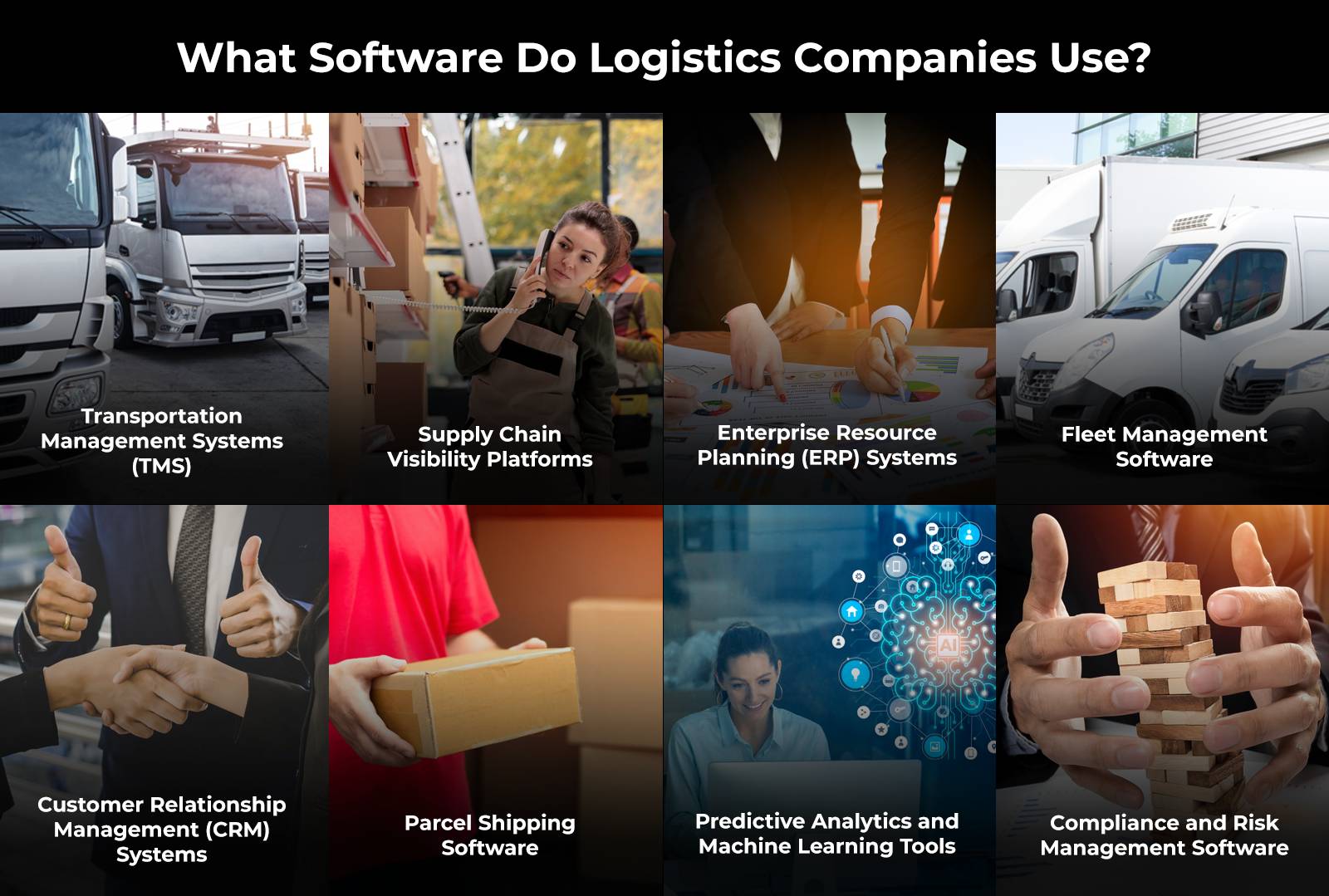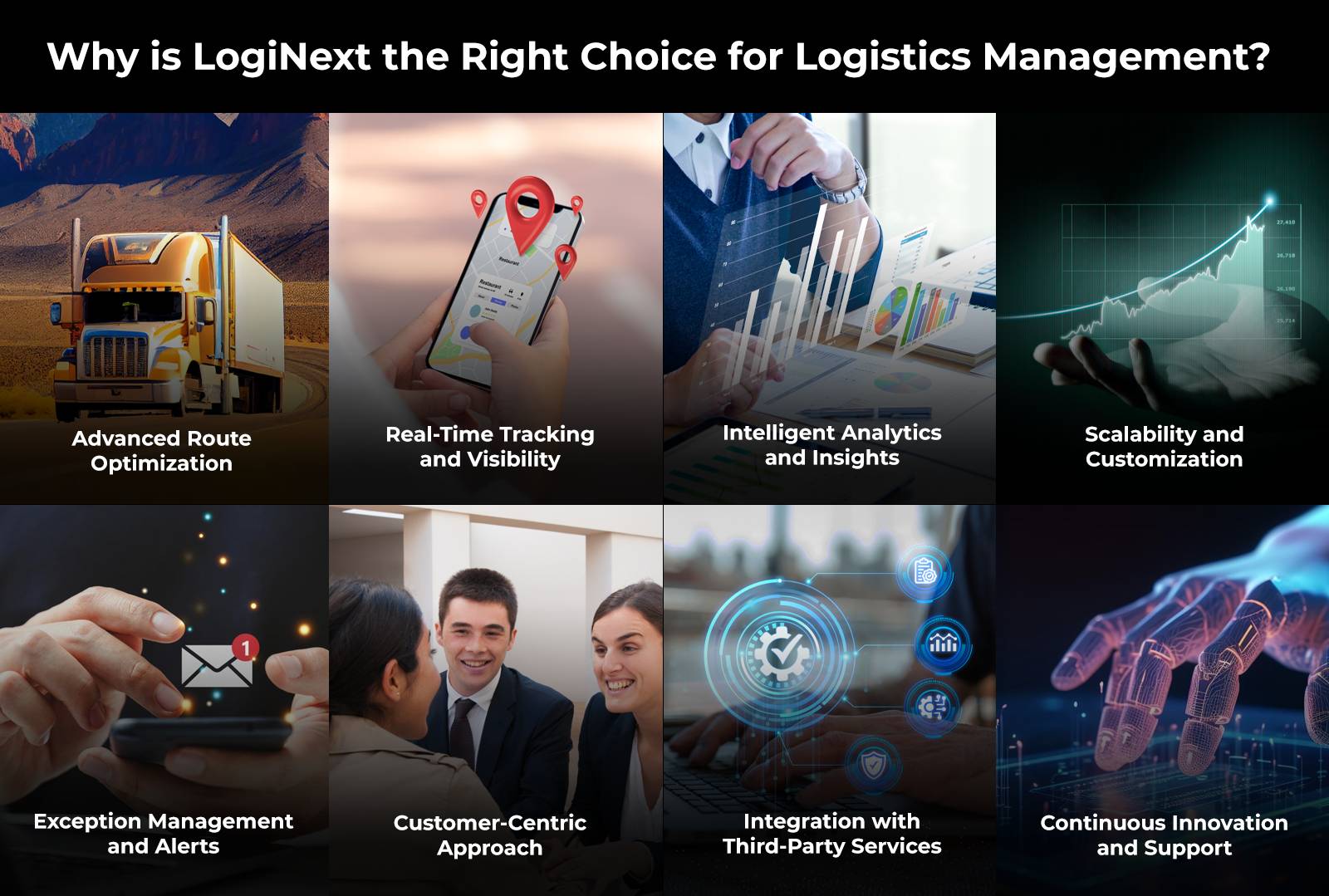
What are the Best Logistics Management Software Tools and Techniques?
In today’s global economy, businesses need efficient logistics management system software to stay competitive and meet customer needs. From manufacturing plants to retail outlets, the effective movement of goods is crucial in optimizing supply chain operations and maximizing profitability.
The Global Logistics Management Software (LMS) market is set to grow at a CAGR of 9.6% between 2021-28.
Businesses use advanced logistics management systems to make processes more efficient, reduce costs, and improve overall effectiveness. Today, we’ll explore the best logistics software tools and techniques revolutionizing how companies manage their supply chains.
70% of logistics companies would use LMS software to optimize their shipping routes, reduce transportation costs, and improve delivery times.
Logistics management systems encompass a range of activities, including transportation, warehousing, inventory management, and order fulfillment. With advancements in technology and the advent of innovative software solutions, logistics professionals now have access to numerous tools designed to automate tasks, optimize routes, track shipments in real-time, and analyze data for actionable insights.
Each tool brings unique features and functionalities, catering to specific needs and challenges faced by businesses operating in different industries and geographies. By embracing these tools and techniques, companies can overcome logistical complexities, improve customer service, and gain a competitive edge in today’s dynamic marketplace.
Logistics Management Software Features

Logistics management technology is a digital solution designed to streamline and optimize the processes of moving goods from one place to another. It incorporates a range of features tailored to meet the complex needs of logistics operations. Here are some key features that make logistics management software solution indispensable in the modern supply chain:
Route Optimization:
This feature uses advanced algorithms to determine the most efficient routes for delivery vehicles, considering factors such as traffic patterns, weather conditions, and delivery schedules. By optimizing routes, companies can reduce fuel costs and delivery times, ultimately improving overall efficiency.
Fleet Management:
Logistics software allows companies to monitor and manage their fleet of vehicles in real-time. This includes tracking vehicle locations, monitoring fuel consumption, and scheduling maintenance tasks. With better fleet management, companies can ensure that their vehicles are operating at peak efficiency and minimize downtime.
Order Tracking and Visibility:
Logistics management systems provide real-time visibility into the status of orders throughout the supply chain. This allows both the company and its customers to track shipments, receive notifications about delays or changes, and ensure timely delivery. Enhanced visibility improves customer satisfaction and helps companies proactively address any issues that may arise.
Warehouse Management:
Warehouse operations play a vital role in the logistics process, and logistics management solution offers features to optimize these operations. This includes inventory tracking within the warehouse, managing picking and packing processes and optimizing storage space utilization. By improving warehouse efficiency, companies can speed up order fulfillment and reduce errors.
Integration Capabilities:
Logistics management systems often integrate with other systems such as ERP (Enterprise Resource Planning) software, CRM (Customer Relationship Management) systems, and e-commerce platforms. This allows for seamless data flow between different parts of the business, enabling better coordination and decision-making.
Analytics and Reporting:
Advanced analytics tools provide insights into key performance metrics such as delivery times, transportation costs, and inventory turnover. By analyzing this data, companies can identify areas for improvement and make informed decisions to optimize their logistics operations.
Mobile Accessibility:
Many logistics management software solutions offer mobile applications or responsive web interfaces, allowing users to access key features and information on-the-go. This enables drivers to receive updated routes and instructions, warehouse staff to manage inventory from handheld devices, and managers to monitor operations remotely. Mobile accessibility enhances flexibility and efficiency, particularly for companies with distributed teams or field operations.
Scalability and Customization:
As businesses grow and evolve, their logistics needs may change. Logistics management technology should be scalable to accommodate growth and customizable to meet specific requirements. Whether it’s adding new features, integrating with additional systems, or adapting workflows, a flexible software solution ensures that companies can continue to optimize their logistics operations as they expand and diversify.
Don’t miss: Navigating The Future With Logistics Management Solutions For Revenue Growth In 2024
What Software Do Logistics Companies Use?

Logistics companies rely on a variety of software tools to streamline their operations, improve efficiency, and meet the demands of a fast-paced industry. Logistics management systems cover a broad spectrum of functions, from managing transportation and warehousing to tracking shipments and optimizing supply chain processes. Here are some of the key types of software commonly used by logistics companies:
Transportation Management Systems (TMS):
TMS software is a cornerstone of logistics operations, providing functionalities such as route planning, carrier selection, load optimization, and freight auditing. TMS helps companies manage the movement of goods across different modes of transportation, whether by truck, rail, air, or sea. By optimizing transportation routes and modes, TMS software reduces shipping costs, improves delivery times, and enhances overall efficiency.
Supply Chain Visibility Platforms:
Supply chain visibility platforms enable logistics companies to track the movement of goods throughout the entire supply chain, from suppliers to end customers. These platforms aggregate data from various sources, including transportation carriers, warehouses, and trading partners, providing real-time insights into shipment status, delivery ETA, and potential disruptions. By enhancing visibility, these platforms help companies proactively manage exceptions, mitigate risks, and improve customer service.
Enterprise Resource Planning (ERP) Systems:
ERP systems integrate core business processes such as finance, procurement, and inventory management into a single, centralized platform. For logistics companies, ERP software provides end-to-end visibility and control over operations, enabling seamless coordination between departments and functions. ERP systems facilitate data sharing, automate workflows, and support decision-making, helping companies optimize resources and drive business growth.
Fleet Management Software:
Fleet management software is specifically designed to manage and optimize a company’s fleet of vehicles. These solutions track vehicle locations, monitor driver behavior, schedule maintenance tasks, and provide insights into fuel consumption and vehicle performance. Logistics management systems help companies improve safety, reduce operating costs, and maximize the efficiency of their transportation operations.
Customer Relationship Management (CRM) Systems:
CRM systems help logistics companies manage interactions with customers and prospects, track sales leads, and streamline communication channels. By centralizing customer data and communication history, CRM software enables companies to personalize interactions, identify opportunities for upselling or cross-selling, and build long-lasting relationships with clients. CRM systems support sales and marketing efforts, driving revenue growth and customer satisfaction.
Parcel Shipping Software:
Parcel shipping software is essential for companies that deal with small package shipments, such as e-commerce retailers or parcel carriers. These solutions automate the process of selecting the best shipping carrier, comparing rates, printing shipping labels, and tracking packages in transit. Parcel shipping software integrates with major carriers’ systems to provide real-time shipping quotes, delivery status updates, and proof of delivery, streamlining the shipping process and enhancing customer satisfaction.
Predictive Analytics and Machine Learning Tools:
Predictive analytics and machine learning tools help logistics companies analyze large volumes of data to identify trends, patterns, and potential opportunities or risks. These tools leverage historical data and advanced algorithms to forecast demand, optimize routing and scheduling, and anticipate supply chain disruptions. By harnessing the power of predictive analytics, logistics companies can make data-driven decisions, improve operational efficiency, and stay ahead of the competition.
Compliance and Risk Management Software:
Compliance and risk management software helps logistics companies navigate complex regulatory requirements and mitigate operational risks. These solutions automate compliance checks, monitor regulatory changes, and ensure adherence to laws related to transportation, customs, trade, and safety. Compliance and risk management software also help companies identify potential vulnerabilities in their supply chain and implement mitigation strategies to minimize the impact of disruptions or compliance violations.
Why is LogiNext the Right Choice for Logistics Management?

Advanced Route Optimization:
Our logistics management system utilizes cutting-edge route optimization algorithms to help calculate the most efficient routes for delivery vehicles. By considering factors such as traffic conditions, weather forecasts, and delivery time windows, LogiNext ensures that drivers take the fastest and most cost-effective routes, reducing fuel consumption and improving on-time delivery rates.
Real-Time Tracking and Visibility:
We provide real-time tracking and visibility into the entire logistics process, from order creation to final delivery. With GPS-enabled tracking devices and mobile applications, logistics companies can monitor the location and status of their shipments in real-time. Thus our logistics management platform allows for proactive problem-solving and better customer communication.
Intelligent Analytics and Insights:
LogiNext’s analytics dashboard offers actionable insights into key performance metrics such as delivery times, vehicle utilization, and customer satisfaction scores. By analyzing this data, logistics companies can identify trends, optimize operations, and make data-driven decisions to improve efficiency and reduce costs.
Scalability and Customization:
Logistics management software with a modular and scalable architecture allows for easy customization and integration with existing systems and workflows. Whether a company is a small startup or a large enterprise, LogiNext can adapt to its unique needs and scale along with its growth. Additionally, we offer a range of add-on modules and features that can be tailored to specific industry requirements, ensuring a flexible and future-proof solution.
Exception Management and Alerts:
LogiNext’s exception management capabilities automatically detect and alert users to any deviations from planned routes or expected delivery times. Whether it’s a traffic jam, a missed pickup, or a delayed delivery, we can quickly notify stakeholders and provide alternative solutions to minimize disruptions and keep operations running smoothly.
Customer-Centric Approach:
We prioritize customer satisfaction by offering intuitive and user-friendly interfaces for both logistics managers and end customers. With features such as self-service portals, real-time tracking updates, and personalized notifications, LogiNext enhances the overall customer experience and builds loyalty for logistics companies.
Integration with Third-Party Services:
LogiNext seamlessly integrates with third-party services such as ERP systems, CRM platforms, and e-commerce platforms, enabling smooth data exchange and workflow automation. This integration streamlines business processes, reduces manual effort, and ensures consistency across systems, enhancing overall operational efficiency.
Continuous Innovation and Support:
We are committed to continuous innovation and improvement, regularly updating our logistics software with new features and functionalities to meet evolving industry needs. Additionally, LogiNext provides comprehensive support services, including training, implementation assistance, and ongoing technical support, to help logistics companies maximize the value of their investment and stay ahead of the competition.
Frequently Asked Questions
What is logistics software?
Logistics software encompasses a variety of technology tools designed to oversee, regulate, and optimize various logistics operations such as inventory management, warehousing, transportation, and order processing
Why should my company consider implementing logistics management software?
Implementing logistics management software offers several advantages, including:
1. Increased efficiency
2. Cost reduction
3. Improved customer service
4. Enhanced control over the supply chain
5. Real-time visibility into logistics operations
What are the key features of logistics management software?
An ideal logistics management software should include the following essential features:
1. Route optimization
2. Transportation management
3. Inventory tracking
4. Order processing
5. Reporting and analytics
6. Warehouse management
7. Integration capabilities
List the best logistics management software
Here’s a list of top logistics management software options:
1. LogiMext SOlutions
2. Fishbowl
3. Rose Rocket
4. Zoho Inventory
6. Upper
What are the benefits of logistic management software?
Here are some benefits of incorporating advanced logistics management software into your business:
1. Simplifies and automates routing, minimizing manual mistakes and delays.
2. Enhances route optimization, resulting in quicker order fulfillment.
3. Allows for easier handling of larger order volumes.
4. Improves real-time inventory tracking and management.
5. Offers valuable insights for more informed decision-making.
6. Ensures efficient and seamless transportation logistics.
Get Your Hands on the Best Logistics Management Software
LogiNext offers comprehensive and customizable logistics management software with advanced features, real-time tracking capabilities, intelligent analytics, and exceptional customer support. By choosing us, logistics companies can optimize their operations, improve efficiency, and deliver superior service to their customers in today’s fast-paced and competitive market environment. Speak to our expert and schedule a free demo to experience the best logistics management software available.
154







@LogiNext